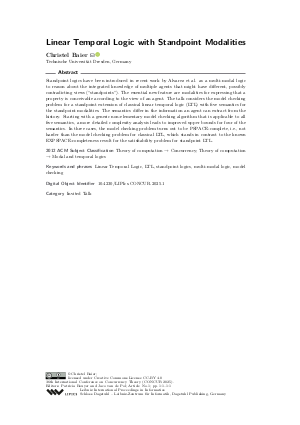Linear Temporal Logic with Standpoint Modalities (Invited Talk)
Author
Christel Baier 
-
Part of:
Volume:
36th International Conference on Concurrency Theory (CONCUR 2025)
Part of: Series: Leibniz International Proceedings in Informatics (LIPIcs)
Part of: Conference: International Conference on Concurrency Theory (CONCUR) - License:
 Creative Commons Attribution 4.0 International license
Creative Commons Attribution 4.0 International license
- Publication Date: 2025-08-18
File

PDF
LIPIcs.CONCUR.2025.1.pdf
- Filesize: 320 kB
- 1 pages
Document Identifiers
Subject Classification
ACM Subject Classification
- Theory of computation → Concurrency
- Theory of computation → Modal and temporal logics
Keywords
- Linear Temporal Logic
- LTL
- standpoint logics
- multi-modal logic
- model checking
Metrics
- Access Statistics
-
Total Accesses (updated on a weekly basis)
0PDF Downloads0Metadata Views
Abstract
Standpoint logics have been introduced in recent work by Alvarez et al. as a multi-modal logic to reason about the integrated knowledge of multiple agents that might have different, possibly contradicting views ("standpoints"). The essential new feature are modalities for expressing that a property is conceivable according to the view of an agent. The talk considers the model checking problem for a standpoint extension of classical linear temporal logic (LTL) with five semantics for the standpoint modalities. The semantics differ in the information an agent can extract from the history. Starting with a generic non-elementary model checking algorithm that is applicable to all five semantics, a more detailed complexity analysis leads to improved upper bounds for four of the semantics. In three cases, the model checking problem turns out to be PSPACE-complete, i.e., not harder than the model checking problem for classical LTL, which stands in contrast to the known EXPSPACE-completeness result for the satisfiability problem for standpoint LTL.
Cite As Get BibTex
Christel Baier. Linear Temporal Logic with Standpoint Modalities (Invited Talk). In 36th International Conference on Concurrency Theory (CONCUR 2025). Leibniz International Proceedings in Informatics (LIPIcs), Volume 348, p. 1:1, Schloss Dagstuhl – Leibniz-Zentrum für Informatik (2025)
https://doi.org/10.4230/LIPIcs.CONCUR.2025.1
BibTex
@InProceedings{baier:LIPIcs.CONCUR.2025.1,
author = {Baier, Christel},
title = {{Linear Temporal Logic with Standpoint Modalities}},
booktitle = {36th International Conference on Concurrency Theory (CONCUR 2025)},
pages = {1:1--1:1},
series = {Leibniz International Proceedings in Informatics (LIPIcs)},
ISBN = {978-3-95977-389-8},
ISSN = {1868-8969},
year = {2025},
volume = {348},
editor = {Bouyer, Patricia and van de Pol, Jaco},
publisher = {Schloss Dagstuhl -- Leibniz-Zentrum f{\"u}r Informatik},
address = {Dagstuhl, Germany},
URL = {https://drops.dagstuhl.de/entities/document/10.4230/LIPIcs.CONCUR.2025.1},
URN = {urn:nbn:de:0030-drops-239513},
doi = {10.4230/LIPIcs.CONCUR.2025.1},
annote = {Keywords: Linear Temporal Logic, LTL, standpoint logics, multi-modal logic, model checking}
}
